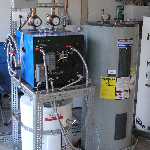Pitch
Use the excess heat in cold water used in a home to make the hot water with a super-efficient, PV powered, water-to-water heat pump.
Description
Summary
The Geothermal Water Heater (GWHP) US Patent #7,827,814 http://www.halslater.com/US7827814.pdf
What it is: The GWHP is a new, highly efficient water heating design for single or multi-family residences in temperate and tropical climates.
How it works: The GWHP extracts excess heat from the cold water used throughout the home with a water-to-water heat pump to heat the hot water used throughout the home. The key factors are that: 1) the typical residence uses three to four times as much cold water as hot water, 2) in some climates the cold water is about 15º-20ºF warmer than it needs to be and 3) water-to-water heat pumps are, on average, more than twice as efficient as air-to-water heat pumps. See http://www.halslater.com/ashp_vs_gshp.pdf
Testing done so far: Four prototype units were built and the ASHRAE 118.2-2006 standard water heater efficiency test to determine Energy Factor (EF) was performed on one of them at UC San Diego. The other three units were installed in homes in different climate zones with meters and thermometers to monitor usage, performance and efficiency. The test report is available at: http://www.halslater.com/FinalReport_56957A-10-04G.pdf
How it compares to the current leader in water heater efficiency, the Air-to-Water Heat Pump (AWHP): The second-generation prototype AWHP operated at an EF of 1.92 compared to our first generation prototype unit which operated at 2.14. Fully optimized per the final report’s Recommendations, the GWHP should be able to reach an EF over 3.25 and an ODE above 2.5.
Four prototype units were built and the ASHRAE 118.2-2006 standard water heater efficiency test to determine Energy Factor (EF) was performed on one of them at UC San Diego Department of Mechanical and Aerospace Engineering. The other three units were installed in homes in different climate zones with meters and thermometers to monitor usage, performance and efficiency. The test report is available at: http://www.halslater.com/FinalReport_56957A-10-04G.pdf
Category of the action
Building efficiency: Physical Action
What actions do you propose?
Develop and promote heat pump water heating to create a low-cost alternative to using fossil fuels to heat water. Water heating with fuel increases both GHGs and adds heat to the urban environment which is the source of the most immediate effects of climate warming.
Electric water heaters have always had efficiencies around 95% but a new generation of optimized heat pump water heaters have reached the 250-275% level by using electricity to extract heat from air to heat the water.
A super-efficient electrically powered water heater can take advantage of the falling cost of PV and avoid the solar thermal system issues like freezing, boiling and scaling of the panels.
Who will take these actions?
Currently, natural gas is the preferred fuel for water heating with the emphasis being placed on increasing the efficiency. Two common gas water heater designs, tankless and condensing, offer efficiencies above 95%, so there is little room for improvement there.
Fuel-switching is discouraged due to the old paradigm that says that converting gas to electricity loses two-thirds of the energy in the gas so it should be used directly where possible.
Public Utility Commissions must take the increased availability of electricity from non-polluting resources when setting policies regarding fuel use.
Where will these actions be taken?
United States in regions with high PV adoption rates and groundwater temperatures above 60F.
How much will emissions be reduced or sequestered vs. business as usual levels?
A typical home uses 20,000,000 BTU/year to heat their water and dumps that amount of heat into their local environment. That represents about 1,100 lbs of CO2 for each gas unit replaced and 3300 lbs for each electric unit, for an average of one ton.
There are about 5 million gas and 5 million electric water heaters sold in the US each year. Approximately 80% of those are replacement units for the estimated 100 million water heaters in use.
Thus, each 1 million water heaters replaced with a zero-polluting model, represents 1% of the potential reduction, 10% of the yearly market and one million tons of CO2 per year reduction.
What are other key benefits?
The GWHP is more versatile in where it can be installed as long as the groundwater is warm enough (at least 60F). There is no fan noise and it does not require a roomful of warm air to provide the heat. In very warm climates, cooling the cold water has added benefits such as being more refreshing to drink and wash with and retarding bacterial growth in the lines.
What are the proposal’s costs?
For either gas or electric, the lowest cost, least efficient water heater options cluster between $300 and $500; the most efficient models cost between $1,000 and $2,000. A super-efficient electric model that uses less electricity to operate than a solar thermal unit uses for backup would offer a price breakthrough for efficient water heating and could yield a 100% solar fraction which no thermal system could ever achieve.
Time line
Heat pump water heating has been around for a long time and has only been attracting research and development in the past ten years. Even so, its pitiful 1% market share of electric water heater sales (compared to tankless' 10% market share) speaks to the challenge at hand. People, including plumbers, don't understand heat pumps (even though they are the basis for refrigerators and air conditioners) and are reluctant to invest in things they don't understand.
A massive public education campaign is needed. Solar leasing companies may offer the best opportunity since it represents a chance to increase the size of their sale.
Related proposals
None
References
http://www.gizmag.com/cold-water-heater/26941/
http://www.halslater.com/10-04G_Final.pdf
http://www.halslater.com/Optimized-AWHP.pdf
http://www.halslater.com/Solar-Hot-Water.htm
